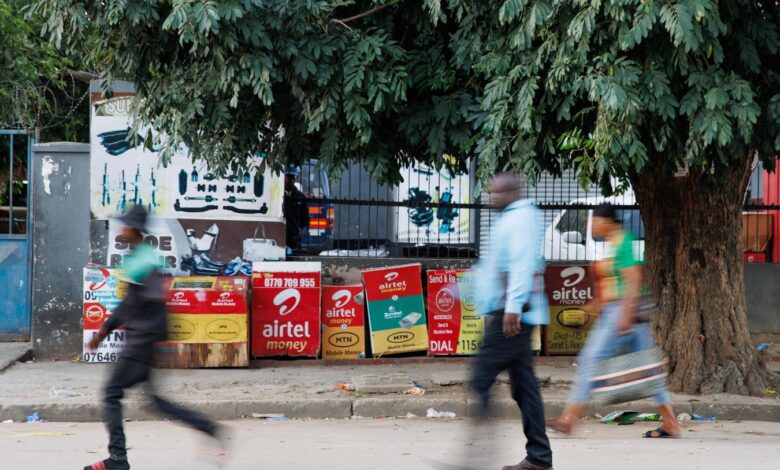Challenges & Opportunities For Future Growth

Closed mobile money kiosks on a roadside in Lusaka, Zambia. Photographer: Luke Dray/Bloomberg
Will open banking work in an unbanked world? Key challenges and opportunities for open finance in Africa.
Market Opportunity
As one of the largest unbanked regions in the world, with low bank branch penetration and a surging increase in smartphone adoption, Africa is primed to become one of the largest and most innovative fintech markets in the world.
Within this sector, the B2B fintech space represents a compelling opportunity for both innovators and investors. Given the low levels of disposable income and the historically poor CAC/LTV ratios for consumer-facing businesses, B2B startups in Africa offer a viable hedge against consumer adoption risk.
Further, growth in venture funding to this sector has been explosive, with over $1.9B in funding in 2022, growing at a 34%+ CAGR. Thanks to a precipitous uptake in mergers and acquisition (M&A) activity, concern around exit opportunities has faded from the minds of investors.
When looking specifically at the open banking market, we see that it stands out as a strong investment sub-sector for many reasons:
- Attractive Total Addressable Market (TAM): A large global TAM estimated to be $100B+ by 2031
- Fragmented Serviceable Addressable Market (SAM): Africa remains comparatively fragmented, with sub-regional entrants emerging across North, West, and South Africa.
- Favorable Regulatory Outlook: No up-front licensing or capital commitments required: open banking initiatives are mostly market-driven, with minimal regulatory hurdles
- Increasing Exit Potential: M&A activity in the open banking space has increased in recent years with over $3B+ in M&A since 2019 (PitchBook Data, Inc.; Data has not been reviewed by PitchBook analysts)
Africa is primed to become one of the largest and most innovative fintech markets in the world.
Market Landscape
When looking at the different players operating directly or indirectly in the open banking market in Africa, one sees four distinct models emerge:
- Data Aggregators: platforms that are aggregating consumer-permissioned banking data for third-party app developers. These platforms typically, integrate into financial institutions via screen scraping, headless browsers, or via Application Programming Interfaces (APIs)
- Core Banking SaaS Platforms: platforms that wrap or replace a financial institution’s existing core banking system, the software that serves as a bank’s primary system of record for accounts, loans, payments, and more. These providers typically integrate directly into a bank’s back-end and expose its internal banking capabilities via API
- Payment Initiation Providers: providers that initiate transactions via the payer’s bank or directly via the account-to-account (A2A) network, depending on the country
- Data Enrichment Platforms: platforms that interpret and transform raw, aggregated financial data into high quality datasets and insights
Data aggregators directly compete in the open banking space, whereas core banking SaaS, payment initiation, and data enrichment platforms are indirectly competing for market share.
B2B startups in Africa offer a viable hedge against consumer adoption risk.
Key Challenges
- Local Market Size: While the total addressable market (TAM) for the global open banking industry may be quite large, the serviceable addressable market (SAM) becomes much smaller when looking at local players building within a single country in Africa. Furthermore, many countries in Africa don’t have enough market size to justify dedicated sales teams and legal resources to service customers in those geographies.
- Customer WTP & Monetization: Unlike customers in established open banking markets, such as the US, most customers in Africa are incredibly price sensitive and do not want to pay per-API-call fees to retrieve data on behalf of customers. This low willingness to pay (WTP) is in part due to the nascency of the open banking industry, as well as the low number of formally banked people in Africa.
- Customer Concentration Risk: Most customers of open banking startups in Africa are existing fintech companies themselves. Therefore, growth in the open finance segment is directly tied to the growth of fintechs in the region. While fintechs startups experienced record investment in 2021, funding in the sector has slowed down in 2022.
Growth in the open finance segment is directly tied to the growth of fintechs in the region.
Key Opportunities
- Bundled Offerings will Drive Customer Retention and ARPU: Bundled product offerings that include data aggregation, payments, and analytics have a better chance of driving customer retention and average revenue per user (ARPU) given the low customer WTP for standalone open banking services in Africa.
- Unique Data Sources Will Drive Customer WTP: Most people in Africa may not be banked within the formal banking sector. Many consume financial services via telecom mobile money operators, savings and credit cooperative organizations (SACOOs), and other informal microfinance businesses. As such, there is a greater opportunity to drive value and willingness to pay with customers if financial data comes from some of these unique sources that are more representative of the whole population.
- Go-To-Market with Banks Can Create Risk-Adjusted Value: Despite the longer sales cycles often involved with banks, banks prove to be stickier and more stable customers than fintech startups. When recessions set in and interest rates rise, VC funding and startup customers can dry up. In addition, financial institutions can act as unique distribution channels for fintechs through which startups can drive incremental growth. However, for these partnerships to be successful banks must also be interested in working with fintechs. Fortunately, because they are often reaching more unbanked people, fintechs in Africa are increasingly perceived as key partners that can drive new users and deposits into the formal banking sector.
The best companies yet to be realized may be focused on alternative data sources that encompass the financial lives of millions more unbanked people in Africa.
Does Open Banking Work in an Unbanked World?
The short-answer is we will have to wait and see.
While data aggregators and core banking SaaS platforms may have found some initial traction, they still need to prove whether there is adequate demand for bank-led open APIs.
Moreover, while these open finance models were built with banks in mind, the best companies yet to be realized may be focused on alternative data sources that encompass the financial lives of millions more unbanked people in Africa.
Alex Talati ’24
Alex Talati ’24 is an MBA candidate and Venture Fellow at Columbia Business School. Prior to school, he was an investor at Visa Ventures, Visa’s strategic venture investment team where he focused on investing in early-stage global fintech startups. While there he drove deal sourcing, evaluation, diligence, and execution across 70+ investments in 20 countries across 6 continents.



